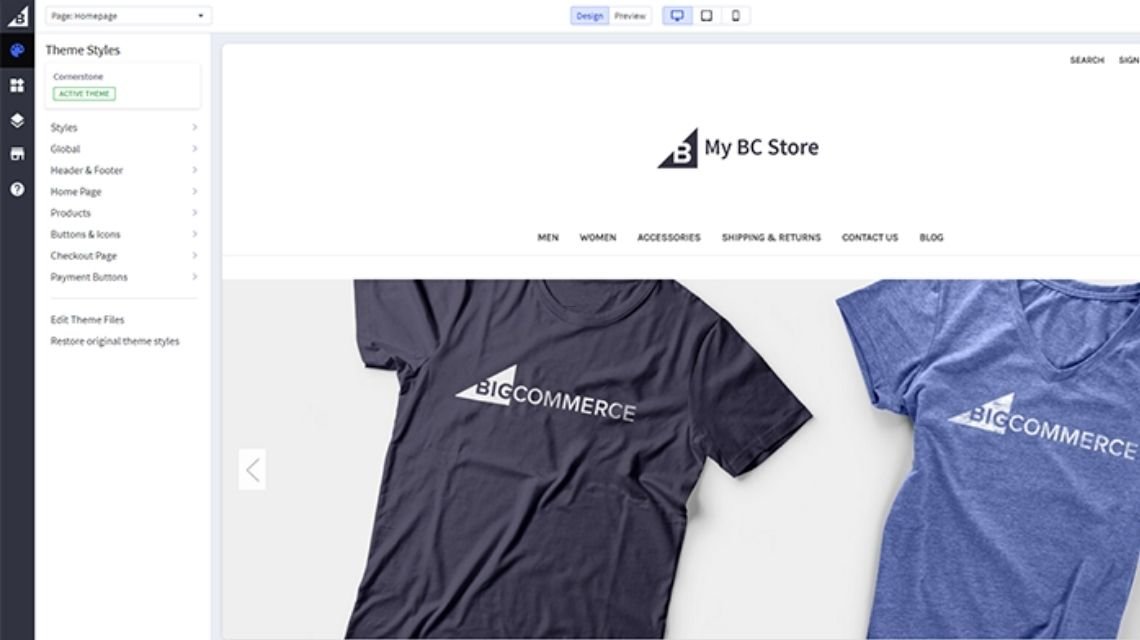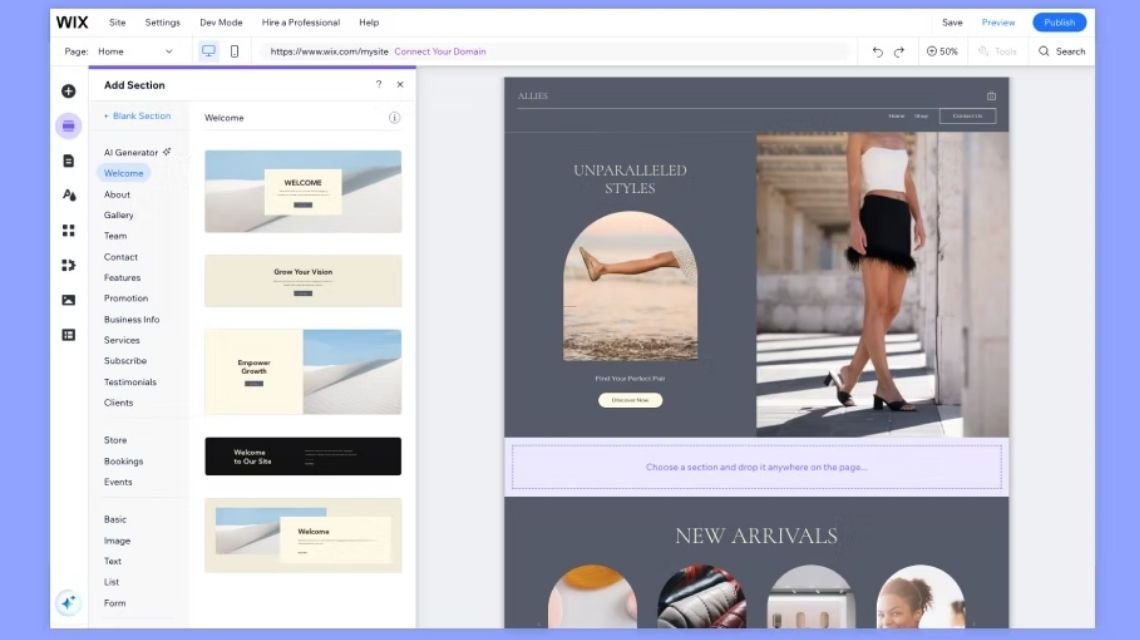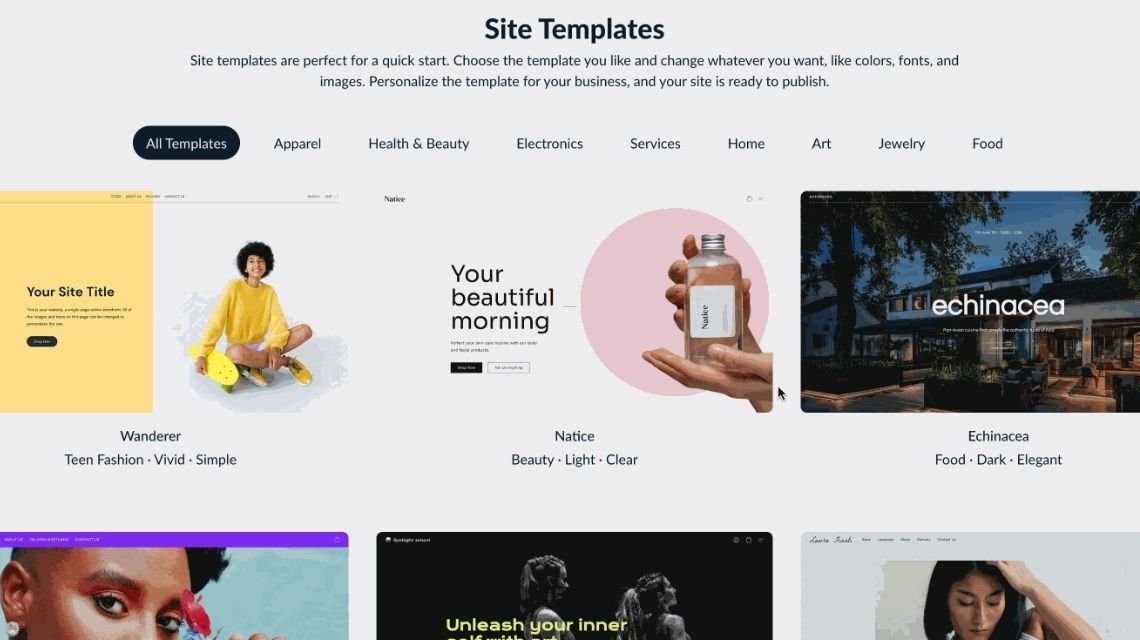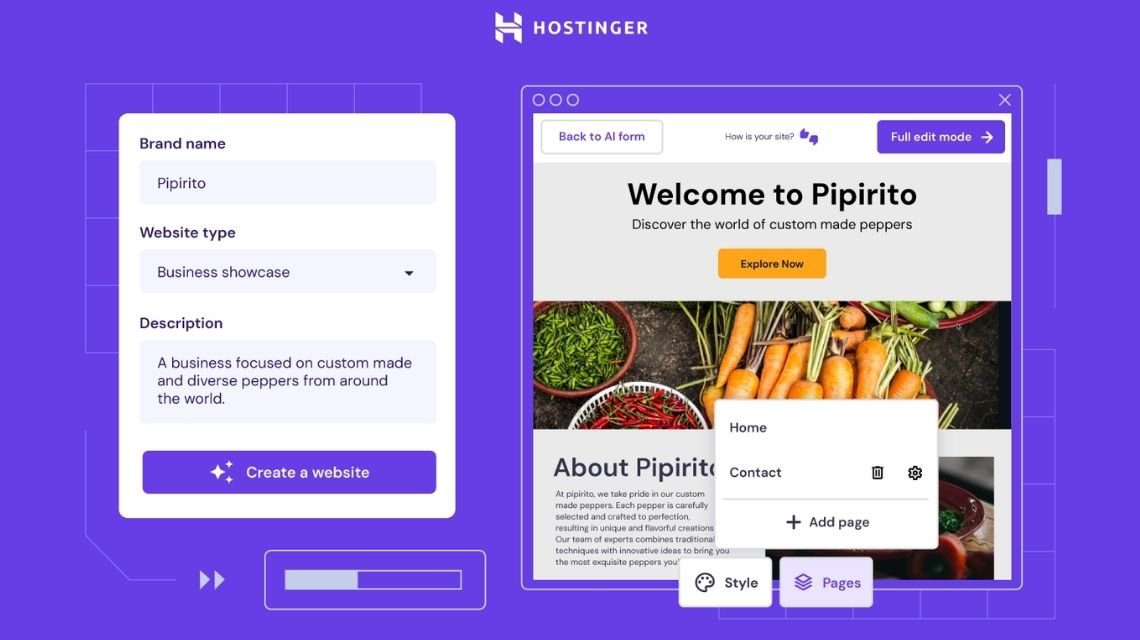
Best Ecommerce Website Builder: Top Platforms to Launch Your Online Store
- minhaj_1109@hotmail.com
- March 5, 2025
- Website Design & Development
- 0 Comments
Such platforms are among the best eCommerce web design companies, delivering solutions that allow businesses to personalize their online presence by integrating advanced features.
Are you interested in starting to sell online? With the best eCommerce website builder, even those with minimal to no coding knowledge can create a professional store fast. Whether a solo entrepreneur or an established brand, a proper e-commerce site builder helps you manage sales conveniently, control inventory, and render a hassle-free checkout experience.
The best platforms deliver essential functionality to boost sales potential, including mobile responsiveness, SEO optimization services, and payment gateway compatibility.
It doesn’t matter if you sell physical goods, digital downloads, or subscriptions; the right solution allows you to reach your customers and grow your brand quickly.
Choosing the best eCommerce website builder for beginners or the best eCommerce website builder for small businesses is determined by your situation.
While some builders have been created primarily for simplicity, others have been intended for scalability, thus perfectly suiting expanding business needs. If you’re on a budget, consider the best eCommerce website builder free options; however, in most cases, paid versions empower vendors with customization and scalability.
Most sellers will dwell in all-in-one solutions, such as the best eCommerce platform, which includes marketing tools and analytics to monitor performance.
Contact ZNZDigitalWorks for advanced e-commerce web development services to build professional online stores that meet your requirements. The company helps new startups and well-established brands create seamless, high-performance websites.
6 Best eCommerce Website Builders for Easy Online Success
Whether you are looking for a top eCommerce site builder for dropshipping or a free shopping website builder with a custom-designed appeal, there is the perfect website solution for your goals.
Here is a list of some of the best website builders for e-commerce to help you get started.
- Shopify – A Top Choice for Small Businesses
- Square – The Best Choice for Retailers Expanding Online
- BigCommerce – The Best Scalable eCommerce Solution
- Wix – The Best All-in-One eCommerce Website Builder
- Ecwid by Lightspeed – The Best Free eCommerce Website Builder
- Hostinger – Best for Selling as a Side Hustle
What Makes an eCommerce Site Builder the Best?
There are countless retail website builders, and with one of them, you can either make or break your online business. The right one should create an easy development process for those without coding experience.
An easy-to-use eCommerce website builder must include user-friendly online tools, customizable themes, and seamless integrations so businesses can develop eCommerce website solution that reflects the brand identity.
The best eCommerce website builders cater to developing their personalized experience for every aspect of what you may be, whether physical products, digital downloads, or subscription services.
If a platform is an eCommerce platform, it truly deserves the title of the best eCommerce platform, one must possess the following features: Any builder that fails to provide these features might not work for your business.
It is crucial for every eCommerce builder to have the following:
1. User-Friendly Design Capabilities
Any semi-technical person should be able to create an attractive, modern, and effective online store from scratch without knowing how to code or design. Integrated graphic design tools and drag-and-drop editors ensure that even beginners can create visually stunning storefronts.
2. Brand Customization & Consistency
A strong online presence reflects a business’s identity. The platform should enable the addition of new colors and the adjustment of fonts and designs to ensure your landing page is consistent with the rest of your branding items and other online media.
3. Flexible Product & Sales Management
The given platform must allow you to sell physical, virtual, or service products in various ways. It should also seamlessly manage your inventory, sales taxes, and international shipping to ensure you can grow your business.
4. Seamless Integrations & Scalability
One main factor is that a great builder should be compatible with other tools and services, such as email marketing systems, payment processors, and analytics solutions. With a full-service eCommerce platform, companies can meet their needs without sourcing them from different service providers.
5. Transparent & Affordable Pricing
Hidden fees and complicated pricing structures can quickly eat into your profits. Ideal sites provide understandable and affordable rates, map reasonable charges for transactions, and attractive packages that can be adjusted to the company’s needs.
If it has all these factors, one should consider the platform among the best platforms to build an e-commerce website in the current market.
How to Select the Right eCommerce Website Builder for Your Store
Choosing the right eCommerce website builder is one of the most critical decisions for any business planning to create an online eCommerce website.
The suitable platform should suit your budget, offer you all the essential features, be user-friendly for beginners and seasoned sellers alike, and have all the required features. Then, consider rating your options properly, from paid builders to an eCommerce website creator, free.
Following are some parameters to consider when choosing the best online website builder eCommerce for your business.
1. Budget: Finding the Proper Balance
Given the differences in financial constraints for each business, it is crucial to land on a platform that gives you the best bang for your buck. While free website builders exist, they come with limitations on customization, storage, or transaction fees. On the paid end, greater design flexibility, scalability, and tools to help grow your business are the deal.
2. Features: To Ensure You Get the Necessities
The best eCommerce site builder tools should contain all the essential features to support online stores, including mobile-responsive templates, payment gateway integration, inventory management, and marketing tools. Other features that can enhance your store’s performance include abandoned cart recovery, multi-channel selling, and SEO optimization.
3. Ease of Use: Your Experience Matters
For beginners, it would help if you opt for a platform that is easy to use when constructing a website. The best online website builder, eCommerce, must have an interface that can be pulled and dropped, templates, and an easily navigable interface. If you have a higher level of experience, go for more versatility and opportunities to code the page from scratch.
4. Support: Reliable Assistance When Needed
An essential factor for a platform is the quality of its customer support, given that technical hitches may occur at any time. See if your preferred builder provides 24/7 assistance via live chat or phone or offers a decent knowledge base. This type of support guarantees that your store stays up and running with minimal downtime.
Analyzing these aspects will help you conclude the best eCommerce site builder that fits your requirements and helps your organization succeed.
How Much Does It Cost to Build an eCommerce Website?
The cost of setting up an eCommerce website depends on your chosen platform, payment processing approach, and additional features.
Unlike traditional website builders, eCommerce platforms have specific pricing structures based on payment gateway fees, transaction costs, and software fees.
Your eCommerce website setup requires the following main costs:
1. Monthly Subscription Fees
Online eCommerce site builders ask customers to pay a regular monthly service fee between $30 and $40 for their standard setups. Basic monthly features range from $100 for advanced features to comprehensive arrangements that exceed $300 depending on functionality.
Free trials run on specific platforms, yet you need to subscribe with payment to sustain the utilization of their services.
2. Payment Gateway Fees
A payment gateway fee is charged for each executed credit card payment. The standard fee is 2.9% + $0.30 per transaction, but it becomes cheaper as your business reaches higher transaction volumes or subscribes to premium plans.
Wix and Shopify offer built-in payment gateways to their platform users, while Stripe, PayPal, and Square are alternative payment processors for different e-commerce platforms.
3. Transaction Fees
Every sale processed through their platform results in an extra percentage-based transaction fee which should range between 1% and 2% unless you select their built-in payment gateway.
Payment processing fees represent the entire financial burden for services that claim zero transaction fees during processing. Customers who use payment gateway services from external providers should verify any hidden fees that might affect their business profits.
4. Additional Costs to Consider
Apart from these costs, businesses should be able to allocate amounts beyond these essential ones, which will cover spending for premium themes, marketing tools, domain registration, and third-party app integrations. Investing in scalable platforms aligned with the budget and weekly business goal is essential to achieve profitable e-commerce stores.
Compare the Best eCommerce Website Builders at a Glance!
| Website Builder | Ideal For | Cost & Subscription Plans | Payment Processing Fees |
| Shopify | Multichannel selling and mobile commerce | Basic: $19, Shopify: $49, Advanced: $299, Plus: From $2,300 | 0% with Shopify Payments; up to 2% if using third-party gateways |
| Square | Retailers expanding online with in-person sales integration | Plus: $29+, Premium: Custom Pricing | 0% with Square Payments; standard processing fee of 2.9% + $0.30 per transaction |
| BigCommerce | Large-scale businesses and marketplace selling | Standard: $39, Plus: $105, Pro: $399, Enterprise: Custom | Varies by a payment gateway |
| Wix | Custom website design with AI-powered tools | Light: $17, Core: $29, Business: $36, Business Elite: $159 | Standard processing fee of 2.9% + $0.30 per transaction with the built-in payment gateway |
| Ecwid by Lightspeed | Best free eCommerce solution for small businesses | Free plan available; Venture: $25, Business: $45, Unlimited: $105 | Varies by a payment gateway |
| Hostinger | A budget-friendly option for side hustlers | Premium: $2.69/month, Business: $3.59/month | Varies by a payment gateway |
Best eCommerce Website Builder for a Fast and Easy Launch
1. Shopify – A Top Choice for Small Businesses

It has been more than 18 years since Shopify’s web builder has stood out as a leader in e-commerce. It can be defined as one of the best platforms for businesses that quickly want to set up an online store.
As the best Shopify store builder, it offers powerful tools, integrations, and an effortless experience for beginners and developing brands. Its features enable multichannel selling, enabling businesses to sell on all major sites like Facebook, TikTok, Amazon, Walmart, and many others using a single dashboard.
Pros of Using Shopify
User-Friendly Shopify Web Builder – Intuitive interface with an easy setup process, perfect for beginners.
Multichannel Selling – Integrates seamlessly to all marketplaces and social media platforms for maximized reach.
Shopify Drag & Drop Page Builder – Customization of store layouts becomes possible without any lines of code being written.
Scalability & Customization – Single entrepreneurs and large corporations use a flexible range of growth options.
Best Shopify Landing Page Builder – High-converting templates enable businesses to create killer product pages.
Cons of Using Shopify
Transaction Fees on External Payment Gateways – Unless using Shopify Payments, businesses pay extra fees per transaction.
Apps Can Get Expensive – Necessary features often come through third-party apps, and the long-term costs mount progressively.
Why Shopify Stands Out as a Store Builder?
Shopify is an integrated web-based solution for creating and operating an e-commerce store. It is easy to use and equipped with a pre-designed theme and page builder to facilitate the creation of a beautiful storefront, even if the client does not know how to code.
It is easy to create an online store and begin selling within a short period, regardless of your technical skills. Every business has inventory management, multiple customer payment options, and integrated marketing functionalities that help increase sales.
Shopify’s ability to sell products on multiple channels outweighs its competitors. It also stands out as one of the few platforms where you can centralize and synchronize your sales from other platforms, such as TikTok, Instagram, YouTube, and eBay.
This free page builder prepares your store for the most effective sales of traditional tangible goods or equipment, including digital goods such as music, films, and eBooks.
Currently, it has more advanced analytics tools, complete automation in shipping solutions, and an extensive marketplace of apps for Shopify stores, making it the best Shopify store builder for small businesses.
Shopify – Pricing Plans and Structure
To use its services, Shopify has different pricing options that accommodate start-ups and growing businesses. New users can begin using a trial service; follow this by signing up for the offer to secure the $1 limited to three-month plan before subscribing.
Basic ($19/month) – Good for sole proprietors and small start-ups.
Shopify ($49/month) – Built for small teams looking to grow their businesses.
Advanced ($299/month) – Great for an advanced set of reports and analytics for growing businesses.
Plus (From $2,300/month) – This enterprise solution is for stores with high transaction volumes and intricate business models.
Each plan allows businesses to craft online stores utilizing sophisticated tools within Shopify, with possible expenses for extra apps to enable certain features. With competitive pricing alongside industry-winning features, Shopify qualifies as one of the finest Shopify landing page builders for serious eCommerce-app sellers.
Best eCommerce Website Builder for Seamless Online and In-Person Sales
2. Square – The Best Choice for Retailers Expanding Online

For small businesses that thrive selling in person and online, Square is among the top online store builders for physically and digitally tied sales. Formerly popular as a point-of-sale (POS) terminal, it builds up for brick-and-mortar businesses, thus being a perfect candidate for retailers, restaurants, or service providers wanting to enlarge their online reach.
Unlike sites that purely target the online-first seller, Square enables one to manage online and offline orders from one intuitive dashboard. Square provides all the tools necessary to integrate and streamline operations. With its easiest online store builder interface, even businesses without technical expertise can launch a polished, professional website.
Pros of Using Square
Best Free Online Store Builder – Begin at no cost; only pay for your needs.
Cheapest Website Builder for e-Commerce – No monthly fees for basic packages; affordable for the smallest businesses.
Effortless Impersonalized Online Sales – Synchronizes with Square POS, making inventory and overall cost management easy.
Top 10 e-Commerce Websites Alternative – For transitioning to sales from offline to online.
Full-Service eCommerce Website Builder – With integrated payment processing, inventory management, and appointment scheduling.
Cons of Using Square
Limited Advanced Customization – Not as flexible as Shopify or WooCommerce for large-scale eCommerce stores.
Best for Small to Medium Businesses – Not ideal for high-volume enterprise sellers.
Why Square Stands Out as a Store Builder?
Hence, unlike other platforms mainly for selling online, Square offers enhanced online store building since physical stores can be integrated into Square. POS integrates inventory, sales, and customer data to avoid cases where stock is finished or customers are sold to other firms.
Indeed, Square could be an ideal fit for service-based businesses. The platform features an array of appointment scheduling tools, which sets it apart from other e-commerce leaders, most of which offer only a plain shopping experience.
Square can manage everything from booking restaurants, ordering in a restaurant, and even appointment bookings.
On this account, it is worth mentioning that Square has a pretty flexible pricing strategy: they start with the best free online store builder and proceed with the chosen plan when the business increases.
Its intuitive design and the fact that it is the most affordable website builder for implementing e-commerce make it valuable to small companies entering the online environment.
Square – Pricing Plans and Structure
Square is reliable for businesses seeking a website builder for their online store. It is an efficient and inexpensive tool for point-of-sale services and selling capabilities.
Start for Free – With the option of adding tools as needed.
Plus ($29 and above) – For restaurants, retail outlets, and service businesses.
Premium (custom pricing) – For stores requiring solutions for more complex operations.
A good bet for the user wanting an easy-to-use eCommerce website creator would be Square, which provides a cost-effective and scalable choice for selling online and in person.
Best eCommerce Website Builder for High-Volume Sales
3. BigCommerce – The Best Scalable eCommerce Solution

BigCommerce is another leading online store builder tailored for businesses that need a comprehensive, scalable solution. Most people consider it a platform used only by giant companies including blue-chip companies like Ted Baker and Johnnie Walker.
However, BigCommerce does provide manageable subscription plans for small companies that do not wish to be limited by their physical walls. Unlike many other online shopping cart solutions, BigCommerce does not charge additional transaction fees, which is good news for growth-oriented companies.
Also, regarding selling through multiple channels, you can list products on eBay, Amazon, Walmart, and Facebook, where they could receive maximum exposure.
Pros of Using BigCommerce
Best Website Builders for Selling Products– Highly customizable and managed tools for products.
No Additional Transaction Fees – One of the central reasons BigCommerce has an edge over its competitors is that it doesn’t cut down on your sales.
Top eCommerce Store Builders for Scalability – Specifically designed for small companies targeting an eventual journey to the enterprise level.
Multi-Channel – It nicely integrates with Amazon, eBay, or Walmart to widen its reach.
Best Webflow eCommerce Sites Compatibility – Integration with headless commerce for more customization.
Cons of Using BigCommerce
Slight Learning Curve – More advanced customization options mean it’s less beginner-friendly as far as its competition is concerned.
Limited Free Themes – You will only get 12 free themes. You will have to pay for premium themes.
Why BigCommerce Stands Out as a Store Builder?
BigCommerce functions as an online store builder yet provides full capabilities to growing businesses that aspire to expand. It also gives store owners complete control over their earnings without forced fee deductions.
Businesses can choose BigCommerce because it incorporates built-in SEO and marketing features that assist companies in search optimization of their online presence, thus making it an excellent option for those debating pay per click vs SEO strategies.
The BigCommerce platform enables steadfast integration with the top e-commerce websites, including Amazon and eBay. This functionality allows businesses to expand their consumer base and boost sales using popular marketplaces.
Businesses seeking growth should consider BigCommerce as their investment since its comprehensive features overshadow the fact that it is not the best free alternative.
BigCommerce – Pricing Plans and Structure
BigCommerce provides a 15-day trial period that shifts to these subscription options for business customers.
Standard ($39/month) – Suitable for individuals and small brands looking to sell online.
Plus ($105/month) – Designed for ambitious small businesses planning to scale.
Pro ($399/month) – Best for fast-growing businesses that need advanced features.
Enterprise (Custom Pricing) – Customized for large organizations with high sales volumes.
Businesses seeking a user-friendly platform for building an online store at no cost should consider BigCommerce as their top selection. This platform was created for businesses to experience quick growth and ownership of their brand identity and sales operations.
Best eCommerce Platform for Building an Online Store and Business Site
4. Wix – The Best All-in-One eCommerce Website Builder

Wix e-commerce platform is one of the best and is excellent for all types of businesses. Unlike platforms dedicated solely to eCommerce, Wix is a full-featured website builder that seamlessly integrates online selling.
It is especially suitable for those who want features of an online store within a company’s general web design but not as a separate website. Wix has extensive development of artificial intelligence frameworks and is widely considered one of the easiest-to-use online store builders.
The latest Wix product, Wix AI Site-Chat, began in December 2024 and allows users to create and manage their shop through straightforward chats. Wix e-commerce has over 120 templates, excellent shipment methods, and a POS system. Wix provides a complete package for sellers who want flexibility.
Pros of Using Wix
Easiest Website Builder for Online Store – It makes setting up and managing a store easy. Thanks to AI tools.
Best Blogging Website Builder with eCommerce – Ideal for companies that think content is an integral part of their marketing effort.
International Selling Support – Help in expansion is even handled by including translation features in Wix.
Best Website Builders for Selling Products – As many as 120 templates are specific to e-commerce needs.
Top Front-End Development Frameworks – With attained advanced development, there is plenty of room for customisation for developers who might feel limited on another website.
Cons of Using Wix
Relatively Not the Cheapest Website Builder for Ecommerce – Even though not as expensive as Shopify, it is above the price point of most other popular options.
Limited to Basic Ecommerce Features – Aside from the fact that it helps scale down some higher end and more complex processes and is excellent for smaller stores, it lacks some of the deeper functionality of platforms like BigCommerce.
Why Wix Stands Out as a Store Builder?
The essential difference between Wix and other eCommerce website creators lies in its ability to serve businesses with a complete website solution that includes full eCommerce capabilities.
Wix delivers market-leading tools for generating engaging content and maintains its position as the most straightforward website builder for running an online store. Its AI-assisted process makes the platform accessible to users with no coding background while simplifying operations.
The Wix POS system serves businesses that operate digitally and physically well. Wix provides developers with maximum customization options as website designers while maintaining ease-of-use functionalities.
Wix is an exceptional website-building platform that helps businesses maintain proper branding management, content creation, and product sales distribution.
Wix – Pricing Plans and Structure
Wix lets users experience its platform features for a 14-day period during which they can request a refund so they can decide whether they want to proceed. The pricing plans include:
Light ($17/month) – Designed for small to medium businesses with a low budget.
Core ($29/month) – For medium businesses to large businesses that want to grow with increased marketing
Business ($36/month) – This plan is best for medium brands who have an ambition to grow further and have the capacity to sell more.
Business Elite ($159/month) – The best plan for corporate organizations already on the growth trajectory and requiring advanced tools and features.
Wix is an appealing online store builder for businesses that prefer simplicity over other systems like Shopify. Businesses that want an excellent blogging platform with built-in eCommerce functionality should select Wix because it meets their content needs and shopping requirements.
Best eCommerce Website Builder Available for Free
Ecwid by Lightspeed – The Best Free eCommerce Website Builder

Ecwid by Lightspeed is one of the best free online store builders, ideal for entrepreneurs who want to start selling with the minimum cost of opening up. Instead of starting from scratch, linking to WordPress, Weebly, Drupal, or other CMS platforms in eCommerce development is a positive feature provided by Ecwid.
Ecwid’s distinct quality is its utterly free feature, which allows a business to sell up to five physical products. For people wanting to start selling online, this is one of the easiest website builders for an online store. While it lacks some advanced features found in Shopify or BigCommerce, it’s still an excellent starting point for businesses with a limited budget.
Pros of Using Ecwid
Easiest Online Store Builder –The built-in feature allows selling on another webpage without using coding in any way.
Great Website Builders for Sale – Its working includes sales capabilities over WordPress and much more.
No Extra Transaction Cost – In this way, you receive every penny of what you earn.
Supports Multiple Payment Gateways – Accept payments via PayPal, Stripe, and Square.
Cons of Using Ecwid
Limited Free Plan – The Free Plan limits your need to five products and requires users to upgrade.
Not a Full Website Builder – More of an eCommerce website creator than a standalone platform.
Why Ecwid Stands Out as a Store Builder?
Developers who need to build an eCommerce website can use Ecwid, which allows them to operate without purchasing another platform. Unlike Shopify or Wix, which require users to create full stores, Ecwid integrates eCommerce functionality into an existing website effortlessly. Small businesses and startups should consider this service because it is among the leading options for building online stores.
One of the unique things about Ecwid is that it is well-known for synchronizing with existing websites, social media pages, and marketplaces. This combined ability allows emerging as well as already established businesses to opt for eCommerce design without building an entire brand-new site.
Ecwid integrates over 70 payment gateways, mobile store management, and integrated SEO and marketing solutions. Its responsiveness makes products accessible across all devices, and the multilingual version can make this e-shop a global player.
Apart from this, it has space for smaller vendors in its free plan and a scalable paid component, making it very flexible in costs. Moreover, being well protected with a safe infrastructure and compliant with PCI DSS, it secures shopping processes for traders and buyers.
Ecwid – Pricing Plans and Structure
Businesses can begin selling at no cost through Ecwid, and they can upgrade their services when needed.
Venture ($25/month) – It is ideal for solo entrepreneurs with up to five products in their business and need several more.
Business ($45/month) – Designed for small but ambitious teams.
Unlimited ($105/month) – For established businesses seeking growth modes.
A perfect eCommerce solution for those pursuing the lowest-cost website builder with professional features exists through Ecwid.
Ecwid is the most straightforward platform for creating a web store for operators who want to take a minimal approach and spend less on their solution before moving to a complete eCommerce system.
Best eCommerce platform with AI-powered tools for building online stores
Hostinger – Best for Selling as a Side Hustle

Using website builders such as Hostinger, starting an online business is very simple. Hostinger is one of the most uncomplicated website builders for online store creation.
As long as you are building some kind of passion project, exploring a new business idea, or just adding that online store to link to your existing site, Hostinger usually makes it all simple without a hitch in the standard setting and without charging you for anything for transactions.
With built-in AI tools and multilanguage support, Hostinger is the best choice for sellers seeking a practical yet cost-effective platform for managing online stores.
Hostinger is also perfect for beginners. Users can create their stores without learning codes by dragging and dropping. Moreover, its AI-powered tools, such as AI-generated heat maps and SEO optimization, support small-scale businesses and considerably increase visibility and conversions.
Pros of Using Hostinger
The Easiest Website Builder for One’s Stores Online – Drag-and-drop with intuition—the best for beginners.
AI-Driven E-commerce Features – Including AI-generated heatmaps, SEO improvement, and intelligent analytics.
No Transaction Fees – Hostinger doesn’t take a fee besides those of another even though many competitors do.
Multi-Language Support – 70 languages, allowing businesses to reach global audiences.
Very Affordable – One of the cheapest builders for ecommerce sites.
Cons of Using Hostinger
Limited Scalability – This may not be ideal for large-scale businesses with complex needs.
Manual Translation Required – Although it supports 70 languages, manual translations are still required.
Why Hostinger Stands Out as a Store Builder?
Hostinger is one of the website builders made for regular entrepreneurs who need not pay high prices for a simplistic online store maker. Its excellent AI tools are crucial for pursuing an edge for small businesses by optimising product listings, tracking customer behavior, and enhancing search visibility.
The automation tools from Hostinger are handy for full-time workers who want to manage their stores from home. They make management more manageable and help grow a business with minimal effort. The hosted platforms are pocket-friendly and have a 30-day money-back guarantee, allowing newbies to try the waters before jumping into a higher-priced plan.
Hostinger – Pricing Plans and Structure
Premium Website Builder: $2.69/month (48 months term +3 months free) – Best for beginners creating a store.
Business Website Builder: $3.59/month (48 months term +3 months free) – Contains several advanced AI tools and enhanced e-commerce features.
Hostinger is thus leading the field with the most cost-effective online, AI-powered solution for small business owners and side hustlers.
Frequently Asked Questions
Which is the best ecommerce website builder for mobile commerce?
Shopify is the most outstanding website creation platform and is best suited for mobile commerce. One reason is its intuitive interface and mobile-optimized themes, which ensure a smooth checkout experience.
With the emergence of mobile-optimized designs among entrepreneurs, businesses increase their chances of converting and improving user engagement.
What is the idea behind a good eCommerce website design?
From a design point of view, an effectively created eCommerce website should be visually appealing, highly prioritized in usability, and fully adaptive to every screen.
It must therefore be used as a shopping means for quick loading times, transparent product displays, and intuitive checkout processes. A strong design builds trust and encourages visitors to complete their purchases.
Can I set up an eCommerce site on WordPress?
Yes, WordPress eCommerce website development allows users to create fully functional online stores using plugins like WooCommerce.
Using them allows one to implement shopping cart functionalities, add product pages, and provide safe payment options while maintaining the vital aspects of the site’s features.
Can I make a site free of charge with Shopify?
Shopify has a trial wherein you can create a store free from upfront costs through a free page builder for Shopify. With the free trial, one can create product pages, use freely provided stock images and themes, and acquire at least one free subdomain. After the trial, one must subscribe to a paid plan to enjoy some of Shopify’s features.
How do different eCommerce platforms handle payment processing and transaction fees?
Payment processing methods and transaction costs vary among different eCommerce solutions. Shopify and Wix include payment gateways that offer competitive pricing, while others, like WooCommerce, rely on third-party services like Stripe or PayPal.
Most platforms impose payment gateway fees with average charges of 2.9% and $0.30 per transaction but could charge additional fees when processor usage is not internal. The assessment of these costs contributes to the most profitable operation of your retail store.
Let’s Wrap It Up!
Most businesses choose Shopify as their preferred eCommerce website builder because it provides automated mobile commerce functionality alongside complete multichannel solutions and connective features. The platform offers an outstanding choice for rapid growth without excessive inconvenience.
However, suppose you want greater design flexibility and an all-in-one website solution. In that case, Wix is an excellent website development solution that delivers user-friendly interfaces and advanced AI tools to generate one-of-a-kind storefronts for users who require additional creativity options.
Selecting the best platform for your business depends entirely on your specific business objectives, technical knowledge, and long-term growth plans.


